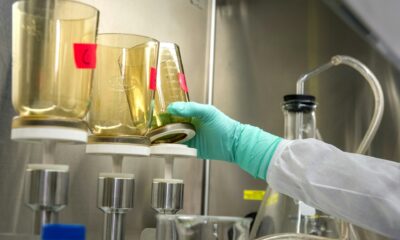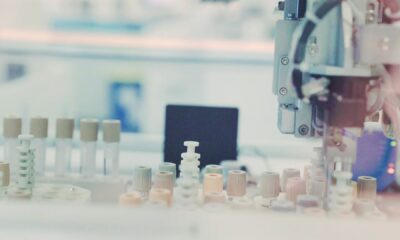Biotech
Investors react to the Sanofi-Regeneron collaboration
Regeneron Pharmaceuticals Inc shares rebounded as investors found out about collaboration partner Sanofi SA’s liquidation of its Regeneron stake. The two companies also plan to restructure their collaboration agreement from 2007. In the global agreement, the companies decided to develop fully human therapeutic antibodies using the latter’s VelociSuite technologies.

The pharmaceutical group Sanofi has put its stake of around 21.6% in its partner Regeneron to the test. Sanofi SA has announced that it is considering a partial or total sale of its approximately 23.4 million shares in the U.S. biotech company.
The French Sanofi informed the U.S. Securities and Exchange Commission (SEC) that it could start selling its stake after the holding period of an investment agreement with Regeneron expired in December 2020. However, Regeneron shares could also be used as collateral for a transaction.
Citigroup analysts consider the SEC filing to be information about an option, not a statement of intent, let alone notice of sale. Sanofi would also need five years under the holding agreement to exit Regeneron completely. According to Citigroup, the biotech company could also buy back some of its shares. Last month, the Regeneron Board approved a $1 billion share buyback program.
Stay informed on the latest biotech advances with Born2Invest. Our companion app includes news updates of finance headlines from business and investing in cannabis, Africa, fin-tech, and more.
Sanofi, known as Sanofi-aventis at the time, also said it will increase its stake in Regeneron from 4% to 19% by buying 12 million newly issued shares at $26 per share. The companies later announced an immuno-oncology collaboration agreement in 2015 to jointly develop a PD-1 inhibitor, which was then in Phase 1 testing.
The agreement was restructured in January 2019 ahead of its scheduled expiration in mid-2020. The amendment made in 2019 allowed Regeneron to retain rights to its IO discovery and development programs, and Sanofi to advance its early-stage IO program independently. Over the years, Sanofi increased its stake in Regeneron to 21.6%.
Sanofi and Regeneron entered a global collaboration agreement in November 2007 to develop fully human therapeutic antibodies using the latter’s VelociSuite technologies. Regeneron has developed the neurodermatitis drug Dupixent, which is also approved for the treatment of asthma and is marketing it in the U.S. jointly with Sanofi under a 2007 cooperation agreement. Sanofi is marketing the product internationally.
Dupixent has “the chance to be one of the most successful drugs in the history of the industry,” said new Sanofi CEO Paul Hudson on Monday, December 9. The company estimated the potential peak sales at more than $11,08 billion (€10 billion) per year. In 2018, the partners set Dupixent at $873 million (€788 million), 268% more than in the previous year.
__
(Featured image by Mari Helin via Unsplash)
DISCLAIMER: This article was written by a third party contributor and does not reflect the opinion of Born2Invest, its management, staff or its associates. Please review our disclaimer for more information.
This article may include forward-looking statements. These forward-looking statements generally are identified by the words “believe,” “project,” “estimate,” “become,” “plan,” “will,” and similar expressions. These forward-looking statements involve known and unknown risks as well as uncertainties, including those discussed in the following cautionary statements and elsewhere in this article and on this site. Although the Company may believe that its expectations are based on reasonable assumptions, the actual results that the Company may achieve may differ materially from any forward-looking statements, which reflect the opinions of the management of the Company only as of the date hereof. Additionally, please make sure to read these important disclosures.
First published in finanzen.ch, a third-party contributor translated and adapted the article from the original. In case of discrepancy, the original will prevail.
Although we made reasonable efforts to provide accurate translations, some parts may be incorrect. Born2Invest assumes no responsibility for errors, omissions or ambiguities in the translations provided on this website. Any person or entity relying on translated content does so at their own risk. Born2Invest is not responsible for losses caused by such reliance on the accuracy or reliability of translated information. If you wish to report an error or inaccuracy in the translation, we encourage you to contact us.

-

 Biotech6 days ago
Biotech6 days agoVolatile Outlook for Enlivex Therapeutics as Investors Await Clinical Catalysts
-

 Impact Investing2 weeks ago
Impact Investing2 weeks agoInter IKEA Launches Electric Truck Fleet to Decarbonize Heavy-Duty Logistics in Italy
-

 Markets24 hours ago
Markets24 hours agoWeather-Driven Supply Outlook Lifts Coffee Markets in Brazil and Vietnam
-

 Markets1 week ago
Markets1 week agoCotton Market Weakens Amid Demand Concerns and Bearish Trends
























